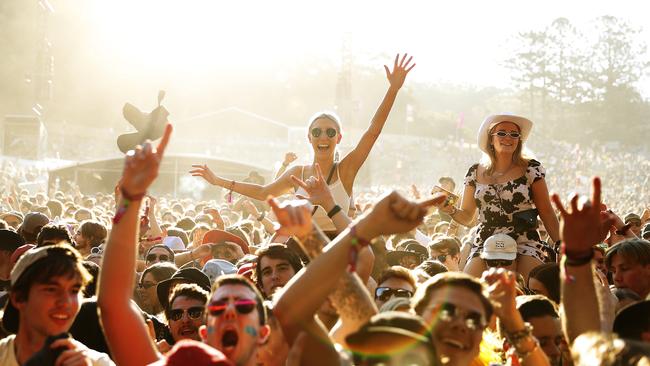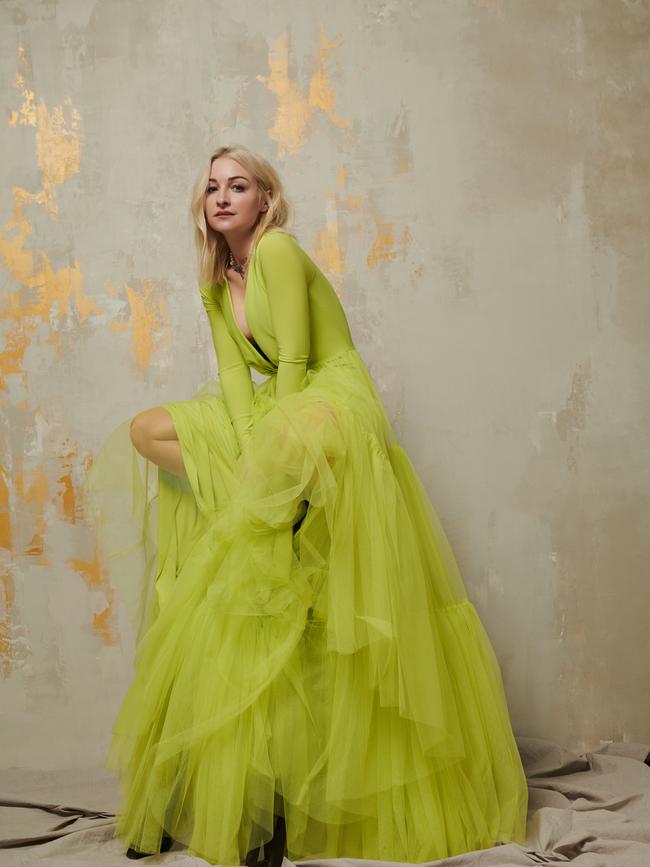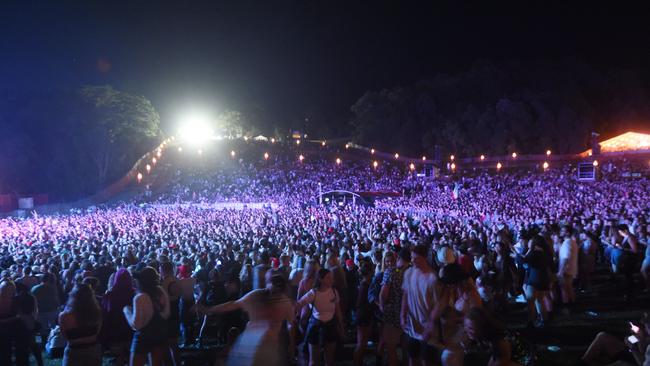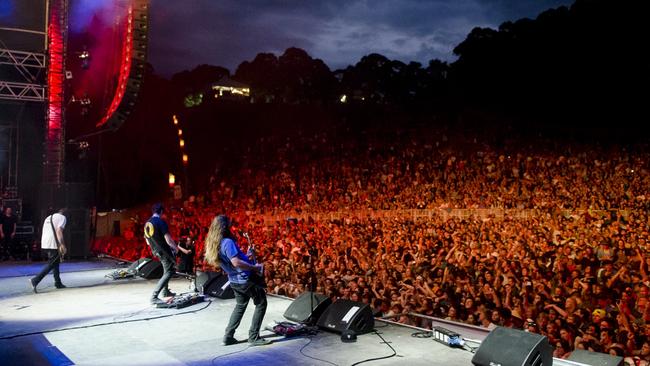The music is live as the show goes on, again
After a livelihood-destroying two-year hiatus, the live-music industry is joyfully finding its feet again, much to the delight of audiences.

“Missy Higgins has Covid,” read the text message from my manager. “Are you available to replace her at a festival this weekend?”
Did I hesitate to swoop in on someone else’s gig? Did I feel guilty about it when it was my kind and wonderful friend Missy Higgins? After all, we had shared a stage only a couple of days earlier at the Wildflower Festival in Brisbane. Surely I couldn’t take any joy from her misfortune? I texted back immediately. “One hundred per cent yes. I’ll take it. Sign me up.”
Look, I’ve been in the tundra for two years, along with all the other performing artists. We just want to perform.
“Just watch out for any symptoms. You sang a duet with Missy two days ago, right?”
I didn’t need reminding. Every day I’m watching out for symptoms. Respiratory illnesses are a singer’s worst enemy, even in non-pandemic times.
At the start of my career, in the lead-up to a big gig, I once actually gave myself a sore throat by swallowing too much to check if it was getting sore.
I’m more aware now than ever of how incredibly lucky I am to do this for a living. But the impact Covid has had on the music sector cannot be understated.
There’s no such thing as sick pay in music. Music has always been a gig economy. If (when) I get Covid again, I could (will, probably) lose a month’s income or more. Worse, I will let down a whole bunch of people who will also lose income as a result (my manager, my agent, my band members, my crew).

In the old days, the maxim was “The show must go on”. Now the maxim is “There’s-a-good-chance-the-show-may-go-on-if-nobody-gets-sick-or-has-to-isolate-at-the-last-minute.” Not quite as snappy.
And for those on the business side of show business, it’s maddening.
My long-suffering agent Jeremy has spent the past two years not so much as a show-booker as a show rescheduler. Pre-Covid, festivals and shows already succeeded by slim margins. Losing one night can easily mean the difference between success and failure.
Promoters have always been the risk-takers of the industry, betting the cost of production and marketing against the return of tickets. Now, between a global pandemic and natural disasters as we have seen this year on the Australian east coast, they are literally gambling.
Take, for example, the Wildflower Festival tour (in which Missy and I performed the duet). Sarah Blasko had to be replaced for the first performance. She had Covid. Blasko had recovered by the second show, and things went smoothly.
But then Missy and Kasey Chambers both caught Covid. Fortunately though, this didn’t affect the third show; it was cancelled due to flooding.
There is one more Wildflower Festival show in October. The promoters are in our thoughts and prayers.
See The List: 100 Arts & Culture stars
So much work, rehearsal, planning and technical expertise go into ensuring the brief time we’re onstage is as powerful and effective as possible.
Usually audiences only notice lights or audio if something goes wrong. But there are people who have devoted their entire lives to discerning which components mesh to create the most powerful synergy between colours and sound waves. They spend hours preparing, rehearsing, assembling and dismantling the metal, wires and circuitry that are invisible to the congregation.

When the live performance industry went under in mid-2020, these were the people for whom I felt the worst. During a show their work is integral, but they are invisible. And so they were when it all collapsed.
My friend, Steve Varga, was my tour manager and guitar tech when the plague struck. He has worked with everyone from Paul Kelly to Ozzy Osbourne. He wrangled musicians and crew to the airport, dealt with lost luggage, fixed broken instruments, negotiated with power-tripping security guards, and offered wisdom. He did it all with efficiency, grace and good humour, and his job evaporated overnight.
As for me, when Covid struck I was heading into one of those sweet career windows that often only happen once in a lifetime. In 2020, after being Australia’s representative at Eurovision 2019, I was booked into the biggest venues I had ever played.
I was also headed to New York to workshop Muriel’s Wedding The Musical on Broadway.
Still, it was nice to use the abundant Melbourne lockdowns as a chance to reflect and create … NO. It was not that, and I wanted to throttle those people who kept insisting it was. It was a period of hyper-vigilance, degraded mental health, constant anxiety, worrying about money, attempting to stop looking at news, and trying to protect and entertain my three-year-old son.
There were those insisting Zoom gigs were going to be the future of music. Initially, I too got excited about streamed gigs; the level of intimacy seemed unprecedented. Chris Martin from Coldplay sat at his lounge room piano and took requests. We meditated online with Lizzo. We watched John Legend and Rufus Wainwright in their dressing gowns.
I played some gigs via streaming too. After a brief honeymoon period, I realised it was a sad simulation of real congregation. The same way a text conversation is never going to replace a long, boozy meal with a friend.
All live performance is a collaboration between performer and audience (just ask my husband, songwriter Keir Nuttall; it was the subject of his PhD and I’m sick of hearing about it). An integral part of the magic is that everyone in the room senses each other physically, for one unrepeatable moment in time.
‘We are social beings. These cultural rituals and stories give shape and meaning to our lives’
As an audience member, I want to immerse myself in a crowd, lose myself; I want to feel small, ride waves of awe and laughter, feel the electricity of pin-drop silences, stand up and give thunderous applause.
It’s my version of church, and I know now, after two years in the tundra, that my mental health depends on it. We are social beings. These cultural rituals and stories give shape and meaning to our lives. They give us hope that there’s more that connects us than divides us. We’re animals, dammit, and even if we don’t always want to smell each other, we need to be close enough to do so.

At the moment, among musicians, crew and the industry, the excitement is palpable. Walking on to festival sites and into venues, everyone keeps repeating how lucky we are to be doing this again. My Instagram has lit up with posts from musicians all over the country snapping loving pics of their audiences from the stage. And the audiences are hot! People seem ecstatic to be congregating again for lights, sounds, audio, music, singing, laughter, drama and tears. It’s been, and continues to be, such a hard time for everyone. We gather together and are reminded of hope in our shared humanity.
For now, I just feel immensely grateful to still have my job. Not all of us will be coming back.
Next time you read some whiny think-piece by a show-pony like me, spare a thought for the thousands of professionals around them, and buy a ticket to a show. Preferably one of mine.
P.S. I wasn’t quick enough on that Missy Higgins gig. The Teskey Brothers got in before I could.

To join the conversation, please log in. Don't have an account? Register
Join the conversation, you are commenting as Logout